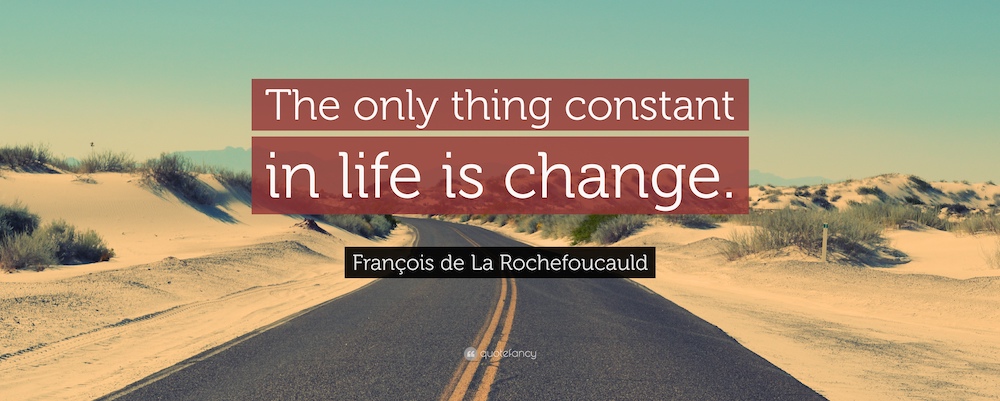
Why Are We So Afraid of Change?
How do you feel about change? Is it something you embrace with open arms? Or is it something that you tend to shy away from?
Change is something that we have to deal with in our everyday lives, whether we are consciously aware of it or not. Sometimes, a change can be full of exciting opportunities, whereas other times, it can appear challenging, daunting, and extremely disruptive. Regardless of what the change is, it is inevitable that it will result in a certain level of stress, and many of us will be reluctant to willingly accept change. But why is this so?
- Change is unfamiliar: Change demands that we adjust the way we conduct our everyday lives, whether that be a way of doing something, a way of perceiving something, or a way of handling something. Change comes in many shapes and forms and it is generally associated with the ‘unknown’, which is frightening. This fear and anxiety are likely to wreak havoc on our stress response, so it’s not surprising that we associate change with unpleasant emotions!
- Change is different: They say you can’t teach old dogs new tricks, but why? Throughout our lives, we develop schemas; these are organised patterns of behaviour or thoughts that guide how we perceive new information and influence how we view the world. Generally speaking, people are more likely to notice things that fit in with their schema, and the accessibility of our schemas depends on how often they are activated in our minds. If you follow a rigid procedure at work every day, then it is likely that this schema will be highly accessible; so when a new way of working is introduced, this change is likely to cause a state of internal disequilibrium as we are unable to assimilate this new method into our existing schemata. When something doesn’t fit in with our existing beliefs, our most common reaction is to ignore this information, when in fact, we would probably feel much better if we tried to accommodate this new information as gradually as possible.
- Change is hard to embed: With age, our brains become more rigid and less plastic, so we are likely to encounter more difficulty when we are approached with change. In relation to the above, our core beliefs and schemata’s about the world and our role in it is likely to be deeply ingrained in the neural networks in our brains and as a result, change can be difficult to incorporate without repeated exposure to it.
- Change is risky: Something ‘new’ can be associated with being less effective as it has not been trialled out like a traditional method, so there is a greater potential of failure. We are likely to reject change on these grounds, as if we are already doing something and it is working for us, then why would we change that? Nevertheless, trying something new and innovative could lead to even bigger success, and old ways of working may fail to keep up with new trends and developments in the world; so why not take the gamble!?
- We don’t like loss! When we experience change, it is likely that we will have to give up something in return. Whether it is a way of working, a way of life, or a personal sacrifice, change will unequivocally generate a feeling of loss, which is unpleasant. In order to embrace change, we need to deal with our feelings of loss productively and get excited about the possibilities ahead of us.
- Change challenges our competence: One of the biggest factors about change that we tend to disagree with is our concerns about our own personal competence. If you’ve started a new job, will you be competent enough to perform your duties to a high standard? If a new piece of software has been introduced, are you skilled enough to learn how to use it? If you’ve just entered a new relationship, will you be adequate enough to meet your partner’s expectations? Competence can be a big challenge for any of us to deal with, but chances are, within a business setting, any significant change should be accompanied by sufficient training and support – so you really have nothing to worry about. As with anything, we just need to believe in ourselves and take things in our stride – everything will eventually fall into place.
How Can We Make Change Easier to Embed in the Workplace?
Our working environments should be inspiring, supportive, and they should enable us to safely experiment with new ways of working. As with any change, the more familiar we become with it, the more likely we are to accept and embrace it. However, embedding change is easier said than done, so why not try using the ADKAR framework to help ease the transition?
What is ADKAR?
ADKAR is a framework created by ® Prosci used for understanding how change happens and it stands for the following:
A – Awareness: Why is a change occurring? What are its benefits? What are the reasons for embedding this change?
D – Desire: How will the change benefit each individual? What are the downfalls of the change and how will this impact the employees?
K – Knowledge: How will you train and educate your employees about the change?
A – Ability: Will your employees be able to apply their new knowledge? Do they have the skills to cope with the change?
R – Reinforcement: How will you reward your employees’ successes? Will you penalise employees for not complying with the change?
If you are interested in finding out more about how ADKAR can help your business, or you are interested in training your employees, why not give us a call?
Masterclass: (+44) 01753 676666
Author: Megan Lazenby, Online Marketing, Masterclass Training Ltd
Useful & Interesting Links:
6 Reasons Why People Don’t Change
Why You’re So Afraid of Change and What You Can Do About It




